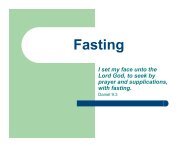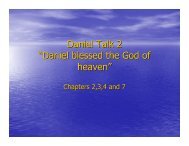Handout - Western Christadelphian Bible School
Handout - Western Christadelphian Bible School
Handout - Western Christadelphian Bible School
You also want an ePaper? Increase the reach of your titles
YUMPU automatically turns print PDFs into web optimized ePapers that Google loves.
1 Jesus’ comments to the effect that we know neither the day nor the hour of his coming<br />
are all 11 found in the Olivet discourse and apply to the indeterminate period between<br />
his first advent and the first of the three great events set out earlier - in the prophetic<br />
part of the discourse. (In order, the three great events are: the temple desecration - Matt<br />
24:15; the time of trouble - Matt 24:21; and the actual return of the Lord - Matt 24:29,<br />
30.) There are only four verses specifying these three significant events. The record is<br />
terse because the Lord was much more concerned that the disciples be prepared - by<br />
having their lives in order - than that they should have their noses glued to a calendar.<br />
His words were for all who were living, or would live, in the phase of history during<br />
which it is necessary to “watch” for his coming. The message is simple. Since we<br />
know neither the day nor the hour of the Lord’s return then we must remain focused.<br />
But while it’s true that we don’t know when the Lord is coming, it doesn’t at all follow<br />
that the matter is unknowable.<br />
2 Mark 13:32 is one of Jesus’ comments: “But of that day and that hour knoweth no man,<br />
no, not the angels which are in heaven, neither the Son, but the Father.” The<br />
application of this statement must be limited to the circumstances applying at the time,<br />
for it is inconceivable that Jesus still “knows not the day nor the hour”. The Lord’s<br />
“need to know” must have changed when “all power was given him” (for otherwise, all<br />
power was not given him). And if we “watch” properly (and I believe this includes<br />
striving to understand the prophetic record), our currently limited knowledge will<br />
likewise change – when we see the sign that indicates the beginning of the last days.<br />
3 Certainly, “the times and seasons” are in the hands of the Father. But just because the<br />
matter is currently sealed, there’s no reason why the Father shouldn’t reveal it if He<br />
chooses. And this is precisely what He has promised to do: Daniel 12:4, 9 ... “O<br />
Daniel, shut up the words, and seal the book, even to the time of the end: many shall<br />
run to and fro, and knowledge shall be increased. ... Go thy way, Daniel, for the words<br />
are shut up and sealed until the time of the end.” So the seals will be removed at the<br />
time of the end (cp Rev 6 – the vision of the 7 seals). See also Daniel 8:6, 17, 19;<br />
10:14; Isa 29:9-18). Habbakuk says (2:3); “... the vision is yet for an appointed time,<br />
but at the end it shall speak, and not lie: though it tarry, wait for it; because it will<br />
surely come, it will not tarry.” Far from teaching that the details of the Lord’s coming<br />
are unknowable, these passages directly teach that they’ll be revealed. But not until<br />
“the end” comes. And the beginning of that “end” will be signalled by the desecration<br />
of a Jewish temple.<br />
4 Remember, too, the well-known comment in Amos 3:7 (“Surely the Lord GOD will do<br />
nothing, but he revealeth his secret unto his servants the prophets”). In that case,<br />
sooner or later, it must be possible to work out the specifics of the prophetic message.<br />
In the meantime, the seals have been loosened to the extent that we are now able to<br />
understand the structure and duration of the important events in relation to each other.<br />
We simply don’t know – yet – when the clock will begin ticking off the countdown.<br />
5 It seems very evident to me that, having given us the key to unlock the prophetic record<br />
(Matthew 24:15-30), the Lord is not likely to immediately, and in the same context, tell<br />
11 Luke 12:40 is in an earlier setting than the Olivet discourse. But it’s in a passage that is so<br />
nearly identical to the corresponding passage in the later discourse (cp Luke 12:39-46<br />
with Matt 24:43-51) that it’s highly probable Luke inserted the later, Olivet, version<br />
between verses 38 and 47 of Luke 12 – as a parenthesis. No doubt he did this because of<br />
the great similarity of the teaching in each context. But having included the passage with<br />
the account of the earlier event, Luke then had no need to include it with his version of the<br />
Olivet discourse (Luke 21), from which it is missing.<br />
Page 59







